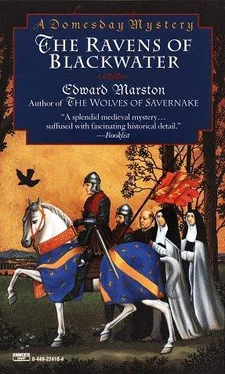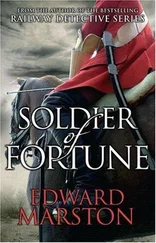Edward Marston - Ravens Of Blackwater
Здесь есть возможность читать онлайн «Edward Marston - Ravens Of Blackwater» весь текст электронной книги совершенно бесплатно (целиком полную версию без сокращений). В некоторых случаях можно слушать аудио, скачать через торрент в формате fb2 и присутствует краткое содержание. Год выпуска: 0101, Жанр: Исторический детектив, на английском языке. Описание произведения, (предисловие) а так же отзывы посетителей доступны на портале библиотеки ЛибКат.
- Название:Ravens Of Blackwater
- Автор:
- Жанр:
- Год:0101
- ISBN:нет данных
- Рейтинг книги:4 / 5. Голосов: 1
-
Избранное:Добавить в избранное
- Отзывы:
-
Ваша оценка:
- 80
- 1
- 2
- 3
- 4
- 5
Ravens Of Blackwater: краткое содержание, описание и аннотация
Предлагаем к чтению аннотацию, описание, краткое содержание или предисловие (зависит от того, что написал сам автор книги «Ravens Of Blackwater»). Если вы не нашли необходимую информацию о книге — напишите в комментариях, мы постараемся отыскать её.
Ravens Of Blackwater — читать онлайн бесплатно полную книгу (весь текст) целиком
Ниже представлен текст книги, разбитый по страницам. Система сохранения места последней прочитанной страницы, позволяет с удобством читать онлайн бесплатно книгу «Ravens Of Blackwater», без необходимости каждый раз заново искать на чём Вы остановились. Поставьте закладку, и сможете в любой момент перейти на страницу, на которой закончили чтение.
Интервал:
Закладка:
Edward Marston
Ravens Of Blackwater
Prologue
Blackwater Hall seemed to hover like a bird of prey over the river estuary whose name it held in its eager talons. Built on a grassy knoll, it stood a mile or so below the town of Maldon and commanded a superb view of the battlefield where the Danes had won a famous victory almost a century earlier. Northey Island looked much now as it did then, a triangular lump caught in the very throat of the river and linked to the mainland by the slender causeway across which the invaders had surged at low tide. Saxon courage had not been able to withstand the might of the Danish army and Northey was a sad memento of defeat. Beyond it was the oval shape of Osea Island and beyond that the River Blackwater pursued its serpentine course past a succession of creeks and inlets, which were fringed with marshes,
mud flats, saltpans, and sandbanks.
The house was imposing. Most of the dwellings in Maldon and the surrounding area were built of timber and roofed with thatch or shingled wood. They were simple structures. Blackwater Hall bore no resemblance to the long, low manor house that it had so comprehensively replaced. Constructed of stone, imported for the purpose from Caen, it was proud and tall with a menacing solidity. Its ground floor was used for storage. The main hall was on the first floor, reached by an exterior flight of stone steps. Above the hall was a gallery off which the various apartments ran. Narrow arched windows looked out with cold disdain. A tiled roof added to the sense of strength and invincibility. Blackwater Hall was like the keep of a Norman castle, an impression that was reinforced by the outbuildings, which were grouped around it to form a courtyard and by the high stone wall, which enclosed the whole property. It was at once built for defence and poised for attack.
Algar despised the place. As he stood there shivering in the courtyard, he had no time to admire the house or to enjoy its splendid view. Nor did he wish to be reminded of the Battle of Maldon even though he had named his son after one of its most noble heroes. Wistan, the Saxon warrior, had killed three Danes before being
overwhelmed; Wistan, the fifteen-year-old boy, was being forced to watch his father’s punishment. Algar could cope with his sickness and could endure the pain that was coming, but he could do neither if his only son was there to witness his humiliation. It was too much to bear. In the bright sunshine of a summer afternoon, Algar was shaking uncontrollably.
“Hold him still!” ordered the steward.
The soldiers tightened their grip on the hapless slave. When Wistan took a protective step forward, a mailed fist knocked him unceremoniously away. His face was on fire and blood trickled from his nose but there was nothing he could do. The steward had four soldiers to help him and a dozen more within earshot The handful of villeins who lurked by the stables were too frightened to protest, let alone to interfere. They were creatures of the lord of the manor and he had taught them their place. Another lesson was now about to be handed out.
“Where is the rogue!” “Here, my lord.”
“That miserable bundle of rags?”
“His name is Algar.”
“I can smell his stink from here.” “He refuses to work.”
“He has no right to refuse!”
Guy FitzCorbucion was striding arrogantly towards them from the house. At his side, with a quieter tread and a more composed manner, was his younger brother, Jocelyn. They were the heirs of Blackwater, the sons of the mighty Hamo FitzCorbucion, a Norman knight who had fought with such ferocity and distinction at Hastings that he had been rewarded with substantial holdings in Essex as well as in other countries. Hamo lived in Maldon and held his honorial court there. When his father was absent-Hamo had returned on business to his native Coutances-Guy was in charge of the estate. It was a role that he relished.
He confronted the miscreant with derisive contempt.
“Look at this pile of ordure!” he sneered. “The cur cannot even hold himself like a proper man.”
“The fellow is ill,” noted Jocelyn with a distant sympathy. “He has
the ague upon him.”
“No!” said Guy. “He is trembling with fear and so he should! I have important concerns here at Blackwater. I do not like to be troubled by a lazy, good-for-nothing slave.”
“I am not lazy, my lord,” croaked Algar. “Be quiet!” yelled Guy.
“Fever has made me weak and-” “Silence!”
The command was accompanied by a kick in the stomach, which made the Saxon double up in pain. Wistan’s anger stirred but he stood rooted to the spot. He and his father were the lowest of the low, mere slaves on the estate of a Norman lord, tied to an existence of unceasing and unvarying toil. They had no freedom, no hope, no right to reply. Hamo FitzCorbucion owned them. His sons could treat them like the beasts of the field mat they were.
Algar mastered his distress and pulled himself upright He wanted at least to offer a token show of defiance in front of his son, but his strength failed him. Worn out by work on the land, Algar had now been wasted by fever. He was barely forty, yet he looked like a decrepit old man. He managed to throw a glance of hatred at Guy FitzCorbucion. The young man exemplified the family name. Corbucion. The raven. A harbinger of death. Guy had the same jetblack hair, yellow eyes, and beaklike nose as his father. His voice was the same insistent caw. He fed on carrion like Algar.
Guy flashed a look of disapproval at the steward. “Why do you bother us with this offal?” he said. “I warned him, my lord.”
“You should have beaten him soundly.”
“Why, so I did,” said the steward, “and the marks are clear upon him. But still he would not give service. I told him that he would be brought before you. He ignored me.”
“Vile wretch!”
“He feigned illness.” “Saxon cunning.”
“He will not work.”
“Wait till I have finished with him!” said Guy darkly. “The insolent dog will beg me to let him work.”
He turned back to Algar with a malevolent smile. The slave shuddered. He knew what to expect. Norman overlords were a law unto themselves. They dispensed summary justice on their estates. Guy FitzCorbucion was typical of the breed and symbolised the hideous changes that had afflicted the county. When the manor had belonged to Earl Derwulf, there were freemen and smallholders in abundance. Algar had been a cotter on the estate, rendering service to his lord in return for a cottage and a tiny patch of land. Now he had been reduced to the status of a slave. Since the Conquest, everybody in Maldon was worse off. Freemen lost their freedom, sokemen surrendered their rights, and smallholders had their land confiscated.
While Algar shivered in his rough woollen tunic, two young Normans stood over him in their rich mantles. While the peasant and his son struggled to survive, the ravens of Blackwater lived in luxury. Algar felt that he was no longer a true man. His bones had been picked clean by the invaders.
Guy indicated a post on the far side of the courtyard.
“Tie him up!” he snarled. “I’ll whip some obedience into his miserable carcass!”
“Wait!” said Jocelyn, hand raised to stop the soldiers from dragging their cargo away. “You are too harsh, Guy.”
“Keep out of this, brother.” “It is a matter for Father.”
“Father would run the man through with his sword.” “He would at least hear the fellow speak.”
“A slave refuses to work. That says all.” “Suspend judgement until Father returns.”
“And let them call me weak?” said Guy vehemently. “Never! I hold the reins here. When an animal falters, it must feel the lash of my displeasure.” He leaned in to glare at his brother. “You are too soft, Jocelyn. They will not respect you for it. Saxons only understand one thing.” He pointed once more to the post. “String him up!”
Читать дальшеИнтервал:
Закладка:
Похожие книги на «Ravens Of Blackwater»
Представляем Вашему вниманию похожие книги на «Ravens Of Blackwater» списком для выбора. Мы отобрали схожую по названию и смыслу литературу в надежде предоставить читателям больше вариантов отыскать новые, интересные, ещё непрочитанные произведения.
Обсуждение, отзывы о книге «Ravens Of Blackwater» и просто собственные мнения читателей. Оставьте ваши комментарии, напишите, что Вы думаете о произведении, его смысле или главных героях. Укажите что конкретно понравилось, а что нет, и почему Вы так считаете.












